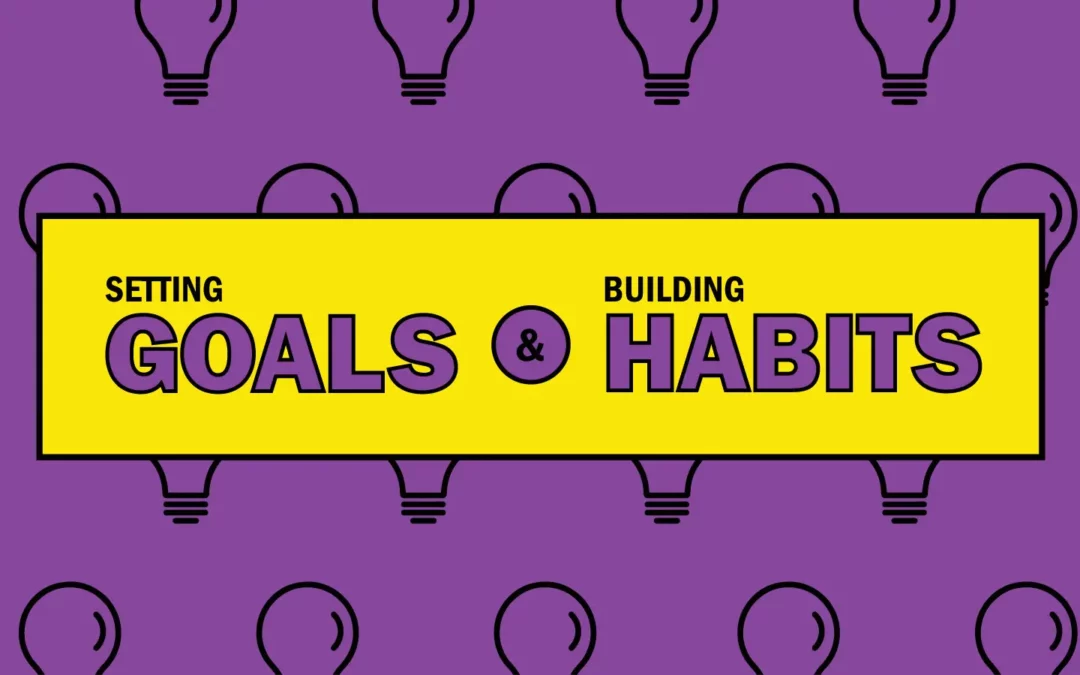The beginning of a new year can be an excellent opportunity to reflect on the previous year and focus on what’s to come next year. With the New Year often comes the making of New Year’s goals and resolutions, things we would like to start doing, stop doing, do more or less of in the upcoming year. Setting New Year’s goals can be a great way to figure out what you want your future to look like. Though, as aspirational as they are, we often don’t meet them as well as we expect to. Setting and accomplishing goals can be super rewarding. However, setting goals in the form of New Year’s resolutions isn’t always the most effective means for self-growth. We end up not reaching these goals, despite having full intentions of doing so, because of habit. Most of what we do during a typical day is out of habit. From an evolutionary perspective, this is good because it allows us to use less conscious effort in our day-to-day lives to use it for more important things. However, the significant portion of our day formed from our habits can cause us to unintentionally perform actions we don’t wish to or fail to perform actions we want.
Contrary to most “rise and grind” quotes you see floating around the internet, the “willpower and discipline” method is an ineffective way to achieve lifestyle-changing goals. Incorporating new habits and behaviours into your life requires more than just setting goals. Goal-setting can often cause us to feel guilty if we don’t meet them and quickly lose motivation to continue the behaviour after completing the goal.
An effective way of managing these goals is to incorporate habits into your day-to-day life that will lead you to achieve them. A goal is a tangible, singular accomplishment, achievable in a certain amount of time and has a quantifiable measurement. Let’s say, for example, that you want to read more books, so you set your New Year’s goal as “read an hour a day.” One common method to accomplish this is to try to use willpower to force yourself to sit down and read for an entire hour every day for the whole year. With this method, you might find yourself successfully doing it once or twice and feeling great about your prospects before this motivation rapidly declines and suddenly a whole week has passed, and you haven’t been doing it. Maybe life got in the way, and you became too busy with school or other things to even think about setting time aside to read. Eventually, this will happen so often that you decide “I’ll try again next month,” repeating the process ad-nauseum, or maybe even “eh, maybe I don’t need to read more anyways.” This is where habit comes in. You’re not reading more because you’re not in the habit of reading, so when life does its usual thing and becomes busy and stressful, you default back to your habits, which unfortunately don’t include reading. If you desire to read more, focus on developing the habit of reading, which can be a much more effective and rewarding way to achieve this goal. Whatever your goal, this method can be a much more effective way to work towards living the lifestyle you want.
According to James Clear, the author of Atomic Habits, there are four main steps to developing new habits: start incredibly small, increase your habit in very small ways, break habits into chunks, get back on track quickly, and stick to a sustainable pace. The idea behind these four steps is to make your desired habit so small that you don’t need motivation or willpower to get yourself to do it; start with a goal so manageable that there’s absolutely no reason you can’t do it. Back to our reading example, you could try “read one hour a week,” or “read one hour a month,” or however small you need to break it down until it no longer feels like a laborious task. Once you’ve mastered this little habit, begin building it up in very small increments. So, your “read one hour a month” becomes “read one hour twice a month”; once you’ve mastered twice a month, you can move on to once a week, and so forth until you’ve reached your desired goal. To keep your goal manageable, you can break them into chunks. Instead of reading for an hour, you can read for two half-hour periods or four 15-minutes periods. Breaking your habit into chunks keeps it from becoming too overwhelming too quickly, which can cause you to lose momentum. When you do slip from your habit, it’s important to get back on track as soon as possible to maintain the progress you’ve made. Research shows that missing a habit for a day or two has no substantial impact on habit-formation, but anything more than that will make it exponentially more challenging to get back in the groove of it. James’ last step, being patient and sticking to a pace that you can sustain, keeps you from burning out and being unable to perform your habit long-term, hindering it from becoming a daily habit. James emphasizes that habits should seem easy, so picking increments of progress that are too large and ambitious will derail your ability to incorporate these habits into your life.
New Year’s goal setting is an amazing act of self-care. It shows that you care about yourself and want to start taking steps to make your life better to be the best version of yourself. The downside of this kind of goal setting is it can often have a negative impact on your self-esteem by making you feel inadequate when willpower alone isn’t enough to get you there. By making tiny changes to your life and being patient with yourself, your goals can become achievable without really feeling like you’re even trying that hard.
For more info on building new habits, check out these helpful articles, as well as James Clear’s book Atomic Habits.
- https://jamesclear.com/habit-guide
- https://www.theladders.com/career-advice/to-build-better-habits-aim-to-improve-your-system-not-yourself
- https://www.forbes.com/sites/nickhobson/2018/01/17/4-simple-habit-forming-systems-used-by-top-performers/?sh=26e7d7be5e5f
- https://thenextweb.com/lifehacks/2015/02/22/goals-losers-building-habits-systems-instead/
Wellbeing blogs are written by the SAMU Wellbeing Assistant, Lauren Rundell.

